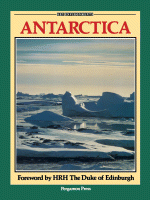Browse content
Table of contents
Actions for selected chapters
- Full text access
- Book chapterNo access
CHAPTER 1 - History and Exploration in Antarctic Biology
D.W.H. WALTON and W.N. BONNER
Pages 1-20 - Book chapterNo access
CHAPTER 2 - Physical Geography — Introduction
D.W.H. WALTON and W.N. BONNER
Pages 21-22 - Book chapterNo access
CHAPTER 2a - Physical Geography — Climate
H.R. PHILLPOT
Pages 23-39 - Book chapterNo access
CHAPTER 2b - Physical Geography — Geological Evolution
D.H. ELLIOT
Pages 39-61 - Book chapterNo access
CHAPTER 2c - Physical Geography — Soils
G.G.C. CLARIDGE and I.B. CAMPBELL
Pages 62-70 - Book chapterNo access
CHAPTER 3 - Terrestrial Habitats — Introduction
D.W.H. WALTON and W.N. BONNER
Pages 71-72 - Book chapterNo access
CHAPTER 3a - Terrestrial Habitats — Vegetation
R.E. LONGTON
Pages 73-105 - Book chapterNo access
CHAPTER 3b - Terrestrial Habitats — Invertebrates
LAURITZ SØMME
Pages 106-117 - Book chapterNo access
CHAPTER 3c - Terrestrial Habitats — Inland Waters
JULIAN PRIDDLE
Pages 118-132 - Book chapterNo access
CHAPTER 4 - Marine Habitats — Introduction
W.N. BONNER and D.W.H. WALTON
Pages 133-134 - Book chapterNo access
CHAPTER 4a - Plankton of the Antarctic Seas
SAYED Z. EL-SAYED
Pages 135-153 - Book chapterNo access
CHAPTER 4b - Marine Habitats — Benthos
GORDON B. PICKEN
Pages 154-172 - Book chapterNo access
CHAPTER 4c - Marine Habitats — Antarctic Fish
KARL-HERMANN KOCK
Pages 173-192 - Book chapterNo access
CHAPTER 4d - Marine Habitats — Antarctic Cephalopods
MALCOLM R. CLARKE
Pages 193-200 - Book chapterNo access
CHAPTER 5 - Birds and Mammals — Introduction
W.N. BONNER and D.W.H. WALTON
Page 201 - Book chapterNo access
CHAPTER 5a - Birds and Mammals — Antarctic Seals
W. NIGEL BONNER
Pages 202-222 - Book chapterNo access
CHAPTER 5b - Birds and Mammals — Antarctic Whales
RAY GAMBELL
Pages 223-241 - Book chapterNo access
CHAPTER 5c - Birds and Mammals — Oceanic Birds of the Antarctic
W.R. SIEGFRIED
Pages 242-265 - Book chapterNo access
CHAPTER 5d - Birds and Mammals — Penguins
BERNARD STONEHOUSE
Pages 266-292 - Book chapterNo access
CHAPTER 6a - The Sub-Antarctic Islands
D.W.H. WALTON
Pages 293-317 - Book chapterNo access
CHAPTER 6b - The Sub-Antarctic Islands — Introduced Mammals
N. LEADER-WILLIAMS
Pages 318-328 - Book chapterNo access
CHAPTER 7 - Food Webs and Interactions: an Overview of the Antarctic Ecosystem
ANDREW CLARKE
Pages 329-350 - Book chapterNo access
CHAPTER 8 - Conservation and Exploitation
BRYAN SAGE
Pages 351-369 - Book chapterNo access
Index
Pages 371-381 - Book chapterNo access
KEY ENVIRONMENTS
Page ibc1
About the book
Description
Antarctica, a vast land remote from the other continents and still the least known of them all, provides a unique international laboratory for science. Despite the costs, a growing number of countries are supporting basic scientific research on the continent and in its surrounding seas. Our knowledge of life in this extreme environment, although limited, suggests that it is a key environment for many areas of science. Potential economic developments for food and minerals as well as increasing political complications might jeopardise the present scientific accord in the future. Now is the time to take stock: what do we know about Antarctic ecology? What are the threats and how can they be met? In this volume Antarctic scientists from six countries write about the Antarctic ecosystem.
Antarctica, a vast land remote from the other continents and still the least known of them all, provides a unique international laboratory for science. Despite the costs, a growing number of countries are supporting basic scientific research on the continent and in its surrounding seas. Our knowledge of life in this extreme environment, although limited, suggests that it is a key environment for many areas of science. Potential economic developments for food and minerals as well as increasing political complications might jeopardise the present scientific accord in the future. Now is the time to take stock: what do we know about Antarctic ecology? What are the threats and how can they be met? In this volume Antarctic scientists from six countries write about the Antarctic ecosystem.
Details
ISBN
978-0-08-028881-9
Language
English
Published
1985
Copyright
Copyright © 1985 Elsevier Ltd. All rights reserved.
Imprint
Pergamon
